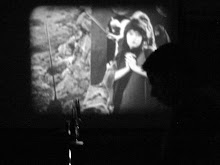After 'One Hundred Years of Solitude' I realized my reading choices would never be the same. 'The Namesake' happened next, a commercial masala work but with Salman Rushdie's 'Shame' the transformation was complete. I'd like to draw an analogy to mechanics in Rushdie's case. While most of understand the laws of motion as given by Newton only the true intellects understand Einstein's concept of space-time. Similarly, in the world of fiction there are usual laws of characterization and narrative which start out and end adhering to all the laws we know and are forced to follow. What laws? Dusk follows dawn, death follows life and the likes. The regular best-sellers that we read don't break this mould. Rushdie cuts loose. For him there are no rules, only imagination. Imagine linking Amitabh Bachchan, Ayatollah Khomeine and Prophet Muhammad! Characters based on famous personalities linked together by magic set his books apart from every other.
Moreover, regular novels tend to take the reader through one dimensional narratives. Rushdie gives so many angles in 'The Satanic Verses', the two leads and their worlds, Gibreel as the archangel in other smaller stories, Saladin's adventures, Ayesha, Jumpy Joshi, Mahound and the list is endless. I don't know what to call this line of thought so I am calling it 'dimensions' just because other writers don't build characters through smaller tales, each of them so interesting & magical by themselves, like Rushdie does. Further, each of these stories is layered, speaking a tale not directly but through our greater but common knowledge.
Salman Rusdhie links stories through lines of dialogues or certain characteristics of the characters involved or even names given to characters, which initially will probably pass unnoticed . I had memorized an example but can't recall it now. Have to keep this in mind while I read further.
The English language has its rules laid down. But not for Salman Rushdie. Although not uncommon for writers to incorporate local lingo into their writing it is Rusdhie who uses it to further the narrative and describe characters. He does not even bother to give the English meaning of the words he uses.
THE CONTROVERSY: Having spent a couple of hours reading about the controversy surrounding the book I must say my feelings are purely for the followers of Islam. Salman Rushdie's exceptional imagination and creativity if kept aside for a moment will reveal the pervert within. No one can weave a tale like Salman Rushdie has done revolving around Jahilia. If I were to try I could not. It's because of my upbringing. Derogatory and detached views of the theology of any religion, mine or any other, does not come naturally to me. I am sure it does not come naturally to anyone else. How could this man do it? I believe Salman Rushdie knew exactly what he was getting into when he wrote 'The Satanic Verses'.
CONTROVERSY ASIDE: Being a Hindu it was not too hard to distance myself from the 'blasphemous' (yes, I do feel that way) references. So here goes,
- The three 'short-stories' did keep me occupied. Especially the pilgrimage with Ayesha which I thought was fantastic. The story of how Baal extracts his revenge deserves both credit to Rushdie's imagination and more so to his perversity. The story of the return to power of the exiled Imam reminded me of a special-effects filled movie where hoardes of people come together at a fortress to dethone some evil queen. Personally, the book is more about these short-stories than that of Gibreel Farishta and Saladin Chamcha.
- The first half of the tale involving Saladin and Gibreel is more engaging than the latter half. It was somewhere in the middle of 'A City Visible but Unseen' where it slipped for me. After this I was not interested in what happened to Saladin and Gibreel, and the people surrounding them.
I have read 'Shame' and 'The Satanic Verses' from Salman Rushdie. Clearly, 'Shame' is better by far.
